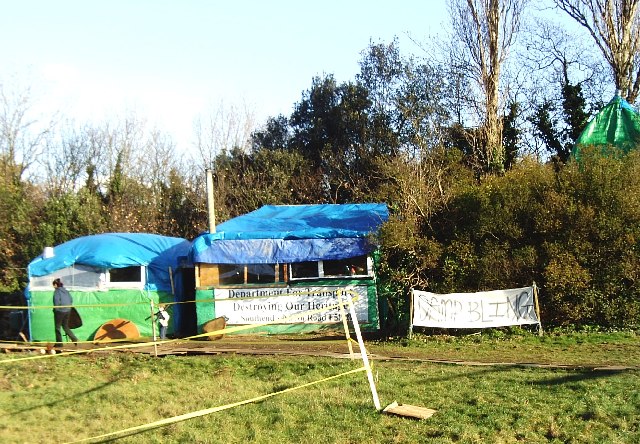Camp Bling on:
[Wikipedia]
[Google]
[Amazon]

 Camp Bling was a UK-based road protest camp set up in
Camp Bling was a UK-based road protest camp set up in
Freedom of information requestRoad fighting is not dead! In England anyway
{{coord, 51.5540, 0.7088, type:landmark_region:GB-SOS, display=title Anti-road protest Transport in Southend-on-Sea Buildings and structures in Essex

 Camp Bling was a UK-based road protest camp set up in
Camp Bling was a UK-based road protest camp set up in Southend-on-Sea
Southend-on-Sea (), commonly referred to as Southend (), is a coastal city and unitary authority area with borough status in southeastern Essex, England. It lies on the north side of the Thames Estuary, east of central London. It is bordered ...
, Essex
Essex () is a county in the East of England. One of the home counties, it borders Suffolk and Cambridgeshire to the north, the North Sea to the east, Hertfordshire to the west, Kent across the estuary of the River Thames to the south, and G ...
during September 2005 to obstruct a £25 million plan to widen the Priory Crescent section of the A1159 road
The A1159 road is a short road skirting the north of Southend-on-Sea from Thorpe Bay to London Southend Airport, in the coastal city of Southend-on-Sea, Essex.
Route
The A1159 commences its journey at Bournes Green Roundabout, its junction with ...
over the Royal Saxon tomb in Prittlewell
The Prittlewell royal Anglo-Saxon burial or Prittlewell princely burial is a high-status Anglo-Saxon burial mound which was excavated at Prittlewell, north of Southend-on-Sea, in the English county of Essex.
Artefacts found by archaeologists in ...
. In April 2009 the authority announced that plans to build the road had been abandoned and the camp was disbanded in July 2009.
History
In 2004Southend-on-Sea Borough Council
Southend-on-Sea City Council is the local authority of the City of Southend-on-Sea, Southend-on-Sea district in Essex, England. It is a Unitary authorities of England, unitary authority, having the powers of a non-metropolitan county and distric ...
proposed the 'Priory Crescent road widening scheme' and a public inquiry was held. The council proceeded with the scheme, estimated at £25 million, explaining that it was important to Southend and that a democratic decision had been taken after considering opposing views. During early excavations, an Anglo-Saxon
The Anglo-Saxons were a Cultural identity, cultural group who inhabited England in the Early Middle Ages. They traced their origins to settlers who came to Britain from mainland Europe in the 5th century. However, the ethnogenesis of the Anglo- ...
king's burial chamber was discovered which was described by British archaeologists as "the most spectacular discovery of its kind made during the past 60 years".
The widening of the road would have resulted in the felling of 111 trees and a loss of of public green space. 20,000 signatories completed petitions against the road.
Of those responding to the official Winter 2001 Civic News survey, only 16 people were in favour of the proposals from a delivery area covering all Southend households.
On 23 April 2009 at a meeting with the council the authority told the protesters that the road widening scheme had been abandoned, and the protesters agreed to leave within 3 months.
The camp
The camp was situated between a main road and a railway line. The site consisted of a large communal area, a visitors centre and several personal dwellings. All buildings were made from re-cycled materials. The communal area featured seating, heating and a bookcase. The buildings were heated by wood burning fires and run off donated wood. Water was collected on a daily basis. Food was cooked on acalor gas
Calor is a brand of bottled butane and propane which is available in Britain and Ireland. It comes in cylinders, which have a special gas regulator.
The company was formed in 1935, and is one of the UK's largest suppliers of liquefied petroleu ...
oven and there was a composting toilet
A composting toilet is a type of dry toilet that treats human waste by a biological process called composting. This process leads to the decomposition of organic matter and turns human waste into compost-like material. Composting is carried ou ...
. A wind generator provided some of the evening lighting.
See also
*Royal saxon tomb in Prittlewell
The Prittlewell royal Anglo-Saxon burial or Prittlewell princely burial is a high-status Anglo-Saxon burial mound which was excavated at Prittlewell, north of Southend-on-Sea, in the English county of Essex.
Artefacts found by archaeologists in ...
References
External links
Freedom of information request
{{coord, 51.5540, 0.7088, type:landmark_region:GB-SOS, display=title Anti-road protest Transport in Southend-on-Sea Buildings and structures in Essex